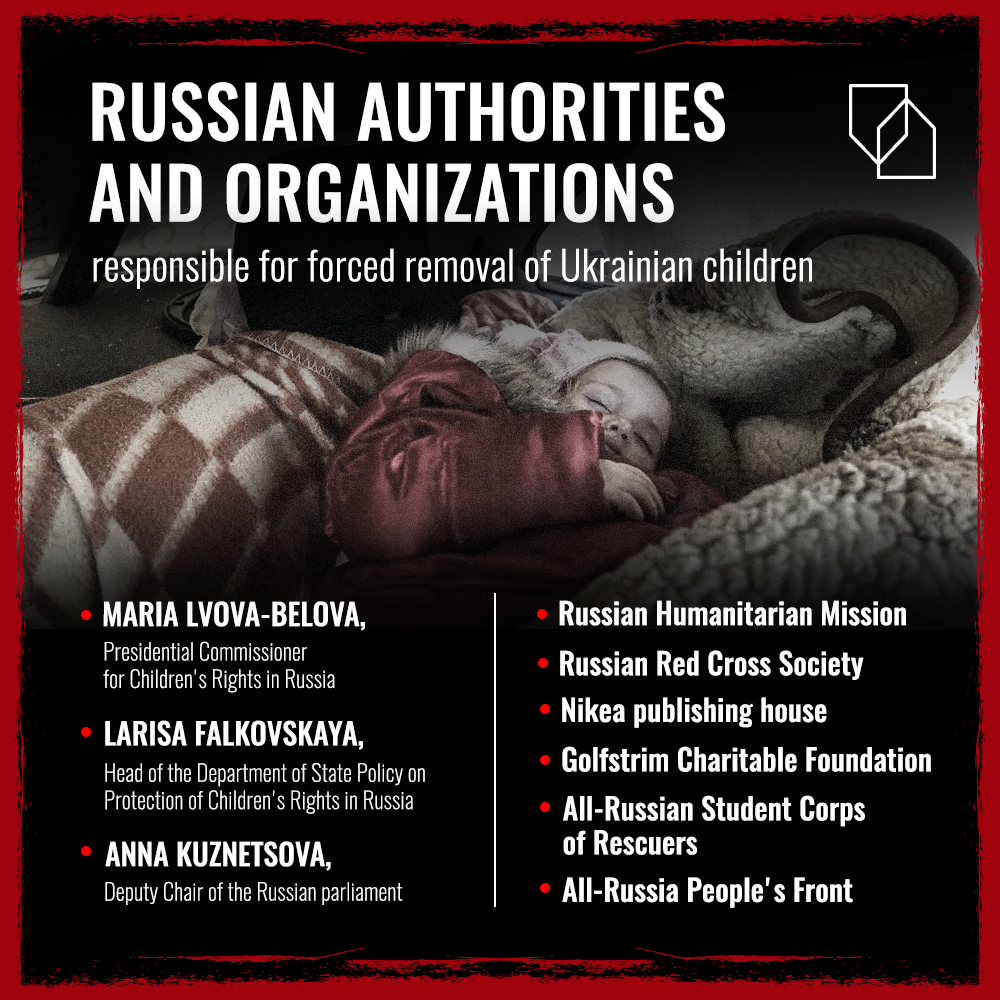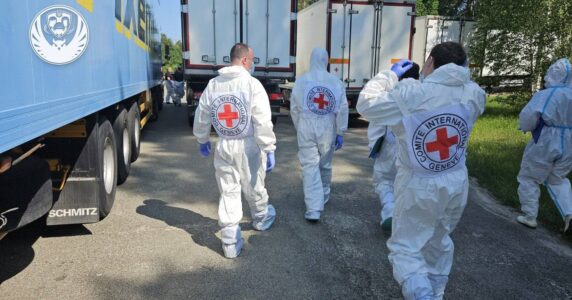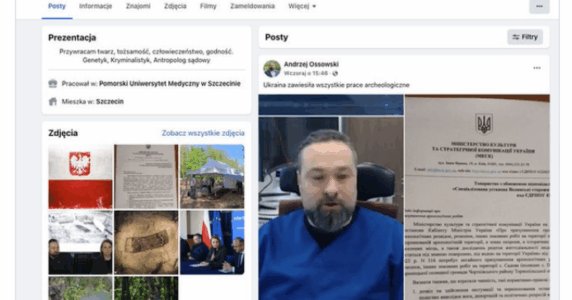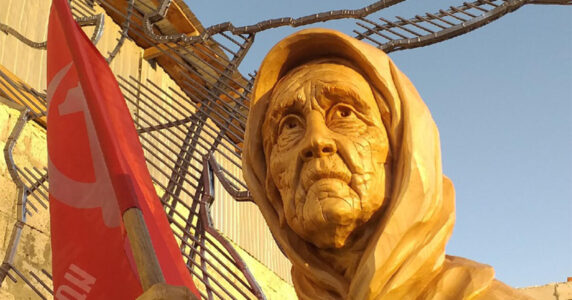Navigation and useful materials
Since the beginning of the large-scale invasion of Ukraine, the Russian government has forcibly “evacuated” Ukrainian orphans into Russia and gave them up for adoption. It is not only about the cruel and atrocious attitude of the occupiers, but also a direct violation of children’s rights and a violation of the UN Convention on the Rights of the Child. The aggressor country has been illegally deporting Ukrainian children from the newly occupied territories to the “LPR” and “DPR,” and later to Russia. An average of 80 children are transported every day from Mariupol to Bezimenne village of Novoazovskyi rayon.
As of May 2, at least 181,000 of Ukrainian children are known to have been forcibly transported to Russia and the so-called “LPR” and “DPR,” with over 1200 of them orphans. Children are forcibly deported to Vladimir, Omsk, Rostov, Chelyabinsk, Saratov, Moscow, St. Petersburg oblasts and to the Sakhalin.
In order to stop the children from coming back home, Russia is preparing to legally simplify and accelerate the adoption procedure. A draft law on simplified registration of orphans has been submitted to the State Duma. According to this draft law, an application and an identity document are enough for registration. Thus, orphans captured by Russia will receive “social support” from the abductor country, and the government will not enforce liability for residence without registration. Additionally, the State Duma of the Russian Federation, together with Russia’s Ministry of Education, has prepared an agreement with the “DPR” and “LPR,” according to which a Russian family can “legally” adopt an orphan from the occupied territories of Ukraine.
According to the President of the Russian Federation, Russian citizenship is not a prerequisite for taking custody of a Ukrainian orphan. This point is taken into account when preparing legal changes in legislation.
To expedite the forcible adoption of Ukrainian children, Russia will conduct a survey and collect data on all children. They will check whether they have close relatives on the territory of “LPR”, “DPR”, or in Russia. In the absence of relatives, temporary guardianship is issued, which will eventually lead to adoption.
Members of the United Russia party actively contributed to the organization of the adoption of Ukrainian children forcibly removed by the occupier. Russia is so caring towards the abducted Ukrainian children that it is ready to organize transportation and treatment of children from “LPR” and “DPR” in Moscow and St. Petersburg; they also initiated a humanitarian campaign to deliver individual help to children. This is a smokescreen hiding the cruel reality: the Russian soldiers have destroyed the homes of Ukrainian children, forcibly transported them to Russia, and are now trying to pretend this was “humanitarian assistance.”
Russia also plans to set up a hub to help orphans deported from Ukraine. It will include representatives of the “LPR” and “DPR.” Orphans under 18 will receive guardians / foster families in “LPR,” “DPR” and Russia. What is more, Russia is so “concerned” about the Ukrainian orphans that it is synchronizing the legislation of “LPR” and “DPR” with the Russian one.
Russia had already deported orphans from the occupied territories of Ukraine in 2014, when it attacked Luhansk and Donetsk regions and seized Crimea. Its actions were considered in Ukraine to be international abduction and illegal displacement of children. Orphans were returned to Ukraine through the European Court of Human Rights.
Russia’s crimes against Ukrainian orphans and the consequences of legislative changes will complicate the process of returning children to Ukraine.
Forcible evacuation of children is a direct violation of children’s rights and a violation of the UN Convention on the Rights of the Child, and forcible deportation of children is prohibited by the Geneva Convention (IV) of 1949, particularly articles 4, 49, and 147.
Russia’s actions concerning the forcible transfer or deportation of children under the protection of the Protecting Power under Geneva Convention IV may be classified under Article 8 (2) (a) (vii) of the Rome Statute of the International Criminal Court as a war crime, namely unlawful deportation or transfer.
International sanctions and international criminal liability should apply to individuals involved in illegal deportation of Ukrainian children to Russia.
Persons involved in the illegal transportation of Ukrainian children to Russia and their adoption by Russian families

- Alexey Petrov — Adviser to the Office of the Commissioner for Children’s Rights under the President of the Russian Federation, Coordinator of the Russian Humanitarian Mission;
- Andrey Anikeev — MP from the United Russia party;
- Andrey Vorobyov — Governor of the Moscow oblast;
- Andrey Turchak — Secretary of the Main Council of the United Russia Party;
- Anton Solovyov — Member of the Legislative Convocation of St. Petersburg, member of the United Russia faction;
- Victoriya Yakimova — Chair of the Board of the Gulfstream Foundation, participant in the action “Into the Hands of Children”;
- Vyacheslav Dukhin — deputy head of the Moscow Oblast government;
- Anna Kuznetsova — Deputy Head of State Duma
- Dmitry Sablin — member of the State Duma of the Russian Federation;
- Artyom Turov — member of the State Duma of the Russian Federation;
- Eleonora Fedorenko — Adviser to the Chair of the “DPR” on children’s rights;
- Larisa Tolstykina — Minister of Labor and Social Policy of the “DPR”;
- Larisa Falkovskaya — Director of the Department of State Policy in the field of protection of children’s rights of the Russian Federation;
- Maria Lvova-Belova — Commissioner for Children’s Rights under the President of the Russian Federation;
- Nikolai Breyev — Director of the publishing house “Nicaea” in Russia, a member of the Public Chamber of Russia;
- Mikhail Bykovsky — an entrepreneur from the Moscow region;
- Nina Ostanina — Chair of the Committee on Family, Women and Children of the Russian Federation;
- Elena Nerozya — Deputy Minister of Education of Saratov region;
- Sergei Mironov — leader of the faction, MP from “Fair Russia — For the Truth”;
- Yana Lantratova — First Deputy Chair of the State Duma Committee on Education;
- Yaroslav Nilov — Chair of the Committee on Labor, Social Policy and Veteran Affairs, Deputy Leader of the Liberal Democratic Party;
- Dmitry Goryachev, call sign “Bury” — “volunteer fighter”, served in the special forces, supported the “accession” of the Autonomous Republic of Crimea to Russia;
- Gulfstream Charitable Foundation (Fund for Support of People with Disabilities; one of the projects is “Helping Women and Children Remaining in ‘LPR’ and ‘DPR’);
- Nicaea Publishing House (Russian publishing house of religious literature, which organized a humanitarian mission for orphans from ‘LPR’ and ‘DPR’ in Russia);
- All-Russia civil movement “People’s” Front ‘For Russia’” (Runway Project, in which orphans from the ‘LPR,’ ‘DPR’ have priority when entering higher and secondary education in Russia);
- All-Russia Student Rescue Corps (student volunteer organization in Russia, headed by Yevgeny Kozeyev);
- Institute of Commissioners for Human Rights in Russia;
- Crisis Center “Mother’s House” of the Moscow Orthodox Relief Service with the support of the Synodal Department of Charity (paid for the purchase of goods for 616 orphans living in three temporary accommodation in Voronezh and Rostov regions);
- Russian Humanitarian Mission (Autonomous Non-Profit Organization);
- Russian Red Cross.
If you have found a spelling error, please, notify us by selecting that text and pressing Ctrl+Enter.


